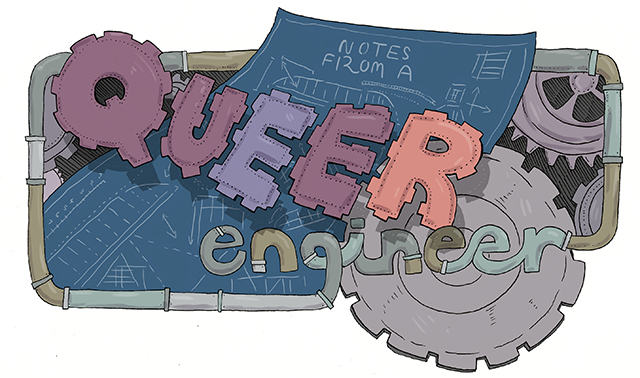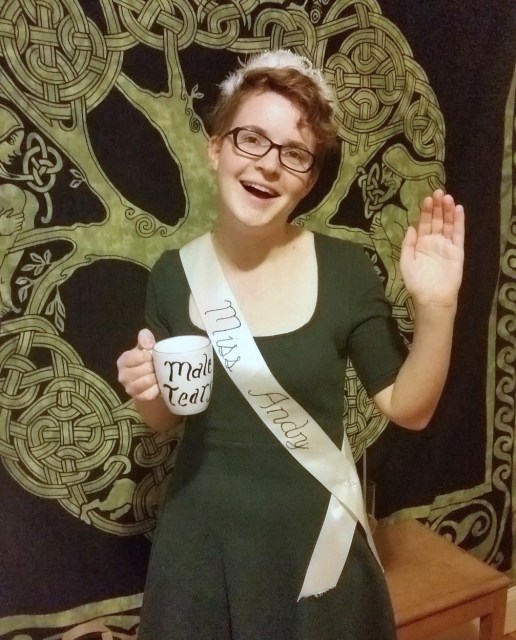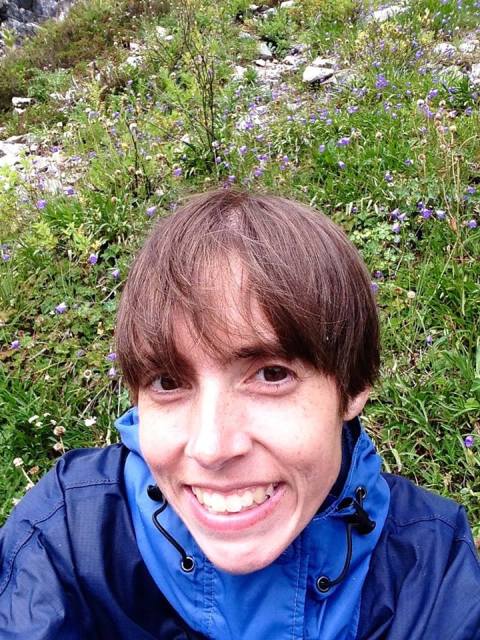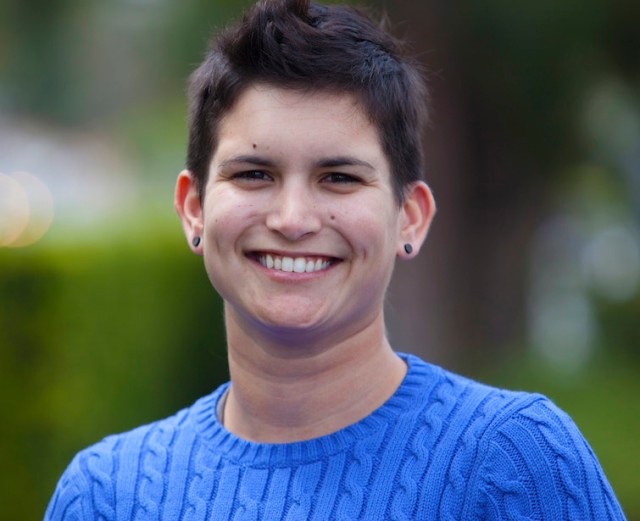 Header by Rory Midhani
Header by Rory Midhani
You all know how much I love talking about women in STEM. But do you know what I like even better? Talking to women in STEM! So for today, I thought I’d take some time to talk with a few kickass, super smart Straddlers who are crushing it in their respective fields: Bessie, Adrienne and Thacher.
Bessie

Laura: What got you interested in STEM?
Bessie: I’ve always really liked building things and learning how things worked. Then when I was in high school my older sister got a manufacturing engineering degree and it really helped me see STEM as a place that a person like me could exist. My sister is a big part of my STEM inspiration and also an amazing toughlepuff (tough + Hufflepuff).
Laura: What do you currently do?
Bessie: I do software development for a cloud services team at an internet security company. Which is a lot of buzz words crammed into one sentence, but basically I work on a team that makes software that other engineers/developers at the company use to make their products. Although, honestly, most of my day is spent googling and asking people questions. :)
Laura: How does your identity inform your work (if at all)?
Bessie: I am sure it does in a million subtle ways, but the most noticeable way for me is my communication skills. Being able to communicate well in software is really important. When you are an out queer person you have to learn how to have difficult conversations and you learn how to explain concepts to people without really knowing how much of it they are going to understand. For me that was really good practice for having difficult conversations and explaining difficult concepts in my professional life.
Also if I’m ever nervous about asking a question at work I remind myself that I looked my parents in eyes when I was 17 and told them I was gay, so giving a presentation to a few engineers as is really no big deal!
Laura: What do you like most about your work?
Bessie: I like taking a complicated task and breaking it down into its smallest component parts. Programming is like legos, but for actions!
Laura: What do people misunderstand about software engineering?
Bessie: That it’s not a place for women. Most of the first programmers were women! Ada Lovelace, Grace Hopper, the ENIAC programmers… Many women are great at making things and communicating and would make awesome programmers!
Laura: Give me a STEM trivia fact.
Bessie: A “computer” used to be a job description. Before machines did computing, it was just rooms full of people doing math. This job was almost exclusively done by women. So basically, women were the first computers!
Laura: What do you do when you’re not working?
Bessie: In the summer I love going on outside adventures! This summer I hiked the northern-most mountain in the Appalacian trail *achievement unlocked*
In the winter I love going on food adventures! Today that adventure is going to be latkes. (Happy Chanukah!)
Adrienne

Laura: You’ve had a very interesting career in STEM so far! Can you give me an overview of where you’ve been and where you’re going?
Adrienne: My journey through science has been fairly eclectic. Growing up in the Pacific NW, I was always a nature-loving kid, but I didn’t call this “science” until I got older. In college, I started out as a biology major, but chemistry won me over. My favorite part of undergrad involved spending two summers in polymer research – it really fueled my love for scientific discovery.
After college, I moved across the country to join an R&D group at a pharmaceutical company. I ultimately left the company for a short (and unfortunately, unsuccessful) stint at a doctoral program in chemistry. Humbled, I returned to the northwest and took a job as a QA lab technician at a pasta company, where I’ve been working for the past two years. When I withdrew from the PhD program, I was at an unhealthy place in my life, but I knew I wanted to eventually pursue grad school again. Now, I’m applying to masters programs in oceanography and hoping to start next fall. In the future, I see myself in a career tackling tangible environmental issues, with both a field and lab component.
Laura: I’m curious about your experience working in academia vs. in industry. How do they compare? What do you like/dislike about each?
Adrienne: In industry, you have a lot more resources and money at your disposal – for example, if you need a new piece of equipment for your research. But working with a money-oriented company also has a frustrating downside, because it’s inevitable that decisions are made from both a business angle and a science angle. And there also isn’t as much freedom to share your data and discoveries. I think my favorite thing about academia is that you’re constantly surrounded by learning and by other people who love to learn. I’m looking forward to getting back to it.
Laura: Give me a science fact, or explain a scientific principle.
Adrienne: You can safely dip your hand in a dewar of liquid nitrogen, even though the temperature is -196°C (cold enough to make instant ice cream at chem club). This is due to a phenomenon known as the Leidenfrost Effect, which means that your body heat causes a protective layer of gas to form around your hand. I am not endorsing this activity, though my own hand fortunately remains unscathed by undergrad lab dares…
Laura: Tell me about something cool you’ve worked on.
Adrienne: I really loved collaborating on a project to help develop a new Alzheimer’s drug when I was working in pharmaceuticals. I loved the experimental process, and I felt at home running new reactions everyday. But even more rewarding was knowing I could be making a tangible difference in treating a devastating illness.
Laura: How does your identity inform your work (if at all)?
Adrienne: I think the connections are more indirect. As a woman in a lab coat, you’re already defying society’s long held gender stereotypes; as a queer woman, even more so. I am grateful to live in a time when neither of these things are stigmatized the way they used to be, and I’ve never felt discrimination in the workplace. But I still think it takes guts to carve out an identity for yourself that doesn’t fit society’s assumptions, especially if you grew up in a highly conservative peer group like I did. I’ve learned to take ownership of all parts of my identity. I’m an agnostic queer woman scientist who still feels clueless about a lot of adulthood – and that’s okay!
Laura: Anything else you’d like to share?
Adrienne: Sometimes when I’m feeling down, I’ll make a list of things I’m grateful for and things I’m curious about. It helps reframe things. This world can be a really beautiful and amazing place.
Thacher

Laura: What do you do?
Thacher: For the past six years I’ve worked as a Business Technology Consultant. Right now I do IT everything for a small company. It’s an in-between job before heading to a coding boot camp.
Outside of that, my passion project is finding better technology solutions for type 1 diabetics. Every piece of this work is meaningful to me because, as a type 1 diabetic, I know the incredible amount of effort the goes into just keeping me alive each day. Because I also have the technical skill set to address this challenge it is something I am constantly working on in one way or another. To me this is the coolest project I can think of… but then again I’m a type 1 diabetic and an uber dork.
Laura: What do you like most about your work?
Thacher: I love being able to solve problems for clients who are really frustrated with something or finding solutions to problems they didn’t even know they had — usually finding a faster or more efficient way to do a task they are currently doing manually.
Laura: What do people misunderstand about what you do?
Thacher: Everything. I would be working as a technical project manager and people would ask me if I could fix their keyboards. Occasionally I would fix keyboards for people I liked, but under the condition that if they told anyone I had fixed it for them I would come back and break it.
Laura: How does your identity inform your work (if at all)?
Thacher: Having come out only a few years ago, it’s nice not to get hit on at work. Other than that I don’t really notice a difference.
Laura: Tell me about coding boot camp you’re going into. Why did you choose to pursue this?
Thacher: It’s a six month full-stack program starting in February. I decided to do this because I was incredibly bored with what I was doing and I dreaded going to work, even though I worked remotely most of the time… it sounds ridiculous, but I hated sitting down at my desk in the morning. There really was nothing seriously wrong with my job. I just grew out of it.
I’m really excited to get started. I love learning and am looking forward to being back in a classroom environment. I’m moving to Seattle for the program, so I’m a bit nervous about that, but I have some really great Autostraddle/A-Camp friends in and around Seattle (shout out to the Outsiders! Denim Vests Forever!). Knowing I’ll have chosen family around is a huge comfort.
Laura: Give me an engineering fact or tip.
Thacher: Queuing theory works wonders for picking the shortest checkout line at the grocery store.
Laura: Anything else you’d like to share?
Thacher: If you’re frustrated working in a male dominated environment, but love what you do — do your best to stick it out. If necessary, switch roles or companies, but don’t give up what you love. Staying with your passion is not only is good for you, it also paves the way for women coming up in your profession… and that is an amazing thing. This came to me as advice from a good friend who talked me down when I wanted to quit a job because of a specific situation. Being in the midst of switching into a more male-dominated field, I think of this every time I start to second guess my choice.
Notes From A Queer Engineer is a recurring column with an expected periodicity of 14 days. The subject matter may not be explicitly queer, but the industrial engineer writing it sure is. This is a peek at the notes she’s been doodling in the margins.








Comments
Thacher!! Loved hearing what you had to say about your work and especially loved your last tip about not giving up on what you love! <3
Loved this article! Go Thatch!
Once again a fascinating article always interesting to hear what other queer women in STEM roles experience and do. :)
Keep them coming. :)
(construction site project phase manager/geotechnical engineer here :P)
Awesome! You guys rock! It’s great to get to know you all. :)
I have been known to dip my finger into a cup of liquid nitrogen while giving student interns their lab safety instruction – “Never, ever do this!” – just to watch their jaws drop.
Love the reference to queuing theory! Always awesome to hear about what other people do.
(From a transportation engineer/ planner, current grad student)
Queueing theory though <3
More science and more scientists, please!
Thacher’s blog is deardiabetesyousuck.com. The word ‘dear’ is missing in the link in this article.
You are correct. Fixed! Thank you!
Fellow STEMmer here. yay!
I love this, as someone who works in such a male dominated field of STEM I don’t actually think I’ve talked to a woman today. (Yes, I am failing the Bechdel test in my own life)
This was neat to read. I’d be interested in what the interviewees and other AS STEMers had to say about the role of mentorship.
Shout-out to dropping out of grad school. That is very hard. I’m in my second grad program so sending you mucho respect and encouragement Adrienne! YOU CAN DO ITTTTT.
Thank you so much! I just finished submitting my applications to the oceanography programs, and I’m pretty excited. :D
This was awesome!!!! I’m in STEM too and it’s so inspiring and encouraging to hear y’alls thoughts. Your answers reminded me why I love STEM so much :)
Another Straddler in STEM here (well, okay, I’m just an undergrad right now, but I’m working my way forward), and I loved reading this! Thank you all for sharing. :D
Glad you enjoyed it! Best of luck in your burgeoning STEM career!
this was awesome to read!
Adrienne here-
Excellent article, @laura-m! I felt honored to be a part of it. I’m happy to see so many other awesome STEM straddlers here. (And welcome to Seattle, Thacher!)
We need more women in STEM. I’m a transgender lesbian in the IT field (sr. infrastructure engineer and team mentor). It’s always been a pleasure to meet another woman in my field. I can’t tell you how important it is to hold up great examples like these to encourage girls to get into and stick with a STEM career.
WOOO Fellow queer women in STEM!
(PhD student in astrobiology here)